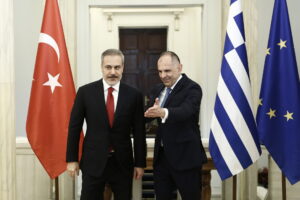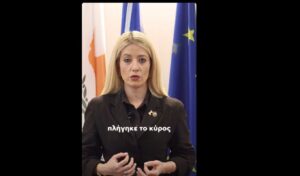Relations between Greek and Turkish fishermen in the Aegean are balanced on a tightrope, as evidenced by daily incidents over fishing rights, culminating in the tension that occurred on Tuesday evening near Agathonisi. Greek initiatives for Maritime Spatial Planning, Marine Parks, the threatened veto for Turkey’s inclusion in SAFE, and Greek-American agreements for upgrading Greece into a Mediterranean energy hub have caused irritation in Turkey and have frozen all diplomatic consultations for implementing the High-Level Cooperation Council, where the Greek Prime Minister and Turkish President would discuss pending issues.
Nevertheless, Prime Minister Kyriakos Mitsotakis assured during his television interview on ERTNews that the meeting with the Turkish President will take place soon, without however specifying a timeline. Foreign Ministry spokesperson Lana Zohiou, in her latest briefing to diplomatic correspondents on the same day, also assured that “after the Confidence Building Measures, diplomatic staffs are working for the next round of Political Dialogue and the Positive Agenda” without providing any schedule.
However, the “calm waters in the Aegean” are now moving in a fluid landscape. The Greek 5X5 initiative undertaken by Greece to bring Mediterranean countries with longstanding pending issues to the dialogue table, primarily concerning EEZ and Continental Shelf delimitation, has so far yielded modest results. This initiative appears to have US support with the ultimate goal of reaching an agreement.
Antonis Klapsis to parapolitika.gr: Energy issues are a catalyst for Greek-Turkish relations
Professor of International Relations Antonis Klapsis, speaking to parapolitika.gr, argues that a final agreement is not easy, however energy issues may act as a catalyst. “I don’t know to what extent it’s easy for Greece and Turkey to reach an agreement, because this means both sides will have to retreat from their established positions,” notes Mr. Klapsis and continues: “This could happen, it’s not impossible, there could be a formula that partially covers, not 100% of both sides. The question is where the balance point is each time and who has the ability to impose, not completely their view, but more dynamically, more of their own view against the other. What I believe is that energy issues are a catalyst, in the sense that they certainly change the landscape in our region. That is, the United States considers energy independence from Russia a very big issue – they invest heavily in this and won’t leave it to chance – and they see it in connection with a broader change in the energy environment in the Eastern Mediterranean and not just in Eastern Europe. Namely, the Greece-Cyprus interconnection, which may also take the form of a connection with Israel. The prospect of research in Greek continental shelf, involving or to involve American companies. I see this as a unified package. I don’t see it as three or four different things, but as pieces in a unified puzzle.”
At the same time, regarding the Cyprus issue, after yesterday’s meeting between Cyprus President Nikos Christodoulides and the new Turkish Cypriot leader Tufan Erhurman, developments appear likely as positive disposition for continuing negotiations was observed.
Mr. Klapsis, however, maintains his reservations about the optimism expressed after Erhurman’s election. He says: “I keep a very small basket, because I believe that, yes, the new Turkish Cypriot leader is certainly more conciliatory or appears to be more conciliatory, we’ll see this in practice too, but, in my opinion, the determining factor, unfortunately, is not the Turkish Cypriots, nor the Turkish Cypriot leader. If the Cyprus negotiation were between Greek Cypriots and Turkish Cypriots, I’m certain the solution would have been achieved 30 or 40-50 years ago. The factor here is Turkey. Turkish Cypriots are dependent on Turkey. Is there a possibility that a Turkish Cypriot leader would agree to a Cyprus solution not in accordance with Ankara’s wishes? I think it’s self-deception, out of touch with reality. The basic issue here is to what extent we can activate a solution that will also have Turkey’s approval and not so much Turkish Cypriot approval. To put it the other way around, a solution that Turkey will approve, but not the Turkish Cypriots, will be implemented in my opinion. A solution that Turkish Cypriots will approve, but not Turkey, will never be implemented.”
“Aegean incidents have decreased dramatically, but this improvement won’t last forever – Turkey continues to have open issues against Greece”
Within this climate, daily life in the Aegean for residents of both countries continues to be difficult with tensions that often reach extreme situations, capable of fueling crisis in Greek-Turkish relations. Professor of International Relations Antonis Klapsis interprets this fact to parapolitika.gr: “We cannot rule out seeing such incidents in the future. The truth, however, is that in recent years, incidents in the Aegean, whether in the form of violations of Greek airspace or incidents in our territorial waters or at sea generally, have been limited, have decreased dramatically, especially regarding airspace violations, we’re almost at zero while in previous years we had I don’t know how many every day. So let’s not be completely negative. There is improvement, but let’s not have the illusion that this improvement will last forever, to the extent that Turkey continues to have open issues against Greece.”




